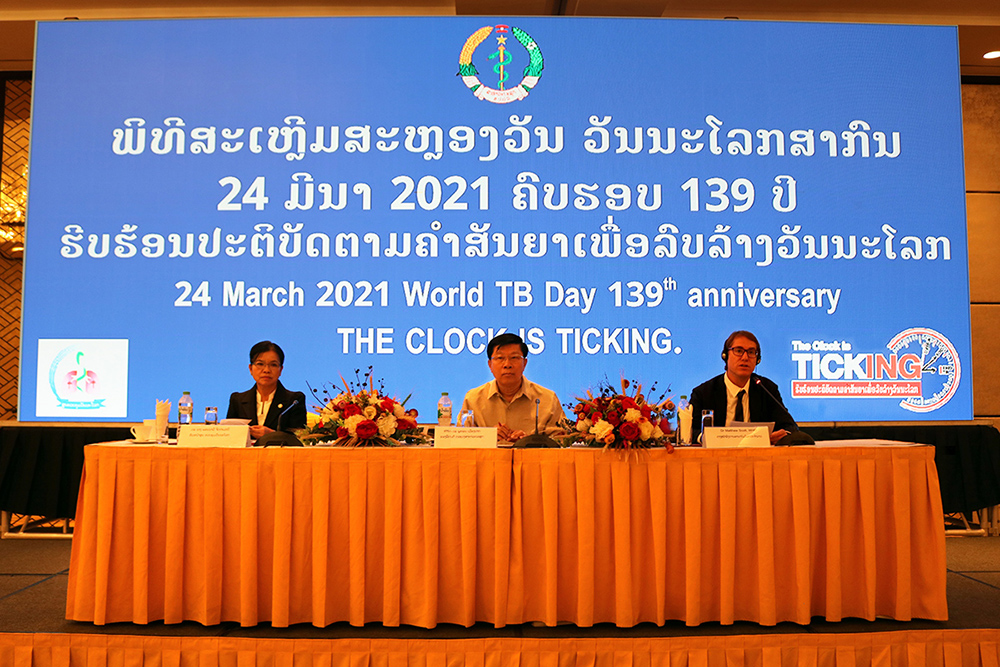To commemorate World Tuberculosis (TB) Day on 24 March, representatives of the Ministry of Health, Tuberculosis (TB) Center, the World Health Organization (WHO) and partners gathered today to raise public awareness about TB, one of the world’s top infectious disease killers, with devastating health, social and economic impacts on people around the world.
 (From left) Director of National Tuberculosis Center Dr. Phonenaly Chittamany, Vice Minister of Health Assoc. Prof. Dr Phouthone Muangpak and WHO HTM (HIV, TB and Malaria) Team Lead Dr. Matthew Shortus at the World Tuberculosis Day Advocacy Meeting. ©WHO/Somlith Khounpaseuth
(From left) Director of National Tuberculosis Center Dr. Phonenaly Chittamany, Vice Minister of Health Assoc. Prof. Dr Phouthone Muangpak and WHO HTM (HIV, TB and Malaria) Team Lead Dr. Matthew Shortus at the World Tuberculosis Day Advocacy Meeting. ©WHO/Somlith Khounpaseuth
The date marks the day when Dr Robert Koch discovered the bacterium that causes TB in 1882. Each day, nearly 30,000 people fall ill with the disease and 4,000 people die from it – despite it being preventable and treatable.
TB is also the leading cause of death for people living with HIV and a major contributor to antimicrobial resistance. The world leaders have committed to end TB by 2030, as part of the WHO End TB Strategy and the 2030 Agenda for Sustainable Development.
The theme of World TB Day 2021 is ‘The Clock is Ticking’, it conveys the sense that the world is running out of time to act on the commitments made by global leaders to end TB. This is especially critical during the COVID-19 pandemic when some essential health services were put on hold, and for TB patients that needs access to treatment, this has put End TB progress at risk.
To ensure equitable access to prevention and care in line with WHO’s drive towards achieving the Universal Health Coverage (UHC), World TB Day 2021 will focus on the following key areas:
- Ensure access to essential TB services in the COVID-19 context and building back better, to ensure no one is left behind.
- Scale up systematic screening to expand early access to prevention & treatment
- Promote health equity, and a rights-based & people-centered TB response in close collaboration with civil societies
- Build accountability to ensure commitments are kept
WHO Representative Dr Mark Jacobs said “A sustainable and effective national response to TB will be crucial for this to be achieved here, and key to that will be ensuring disease programs are well aligned to the 9th National Health System Development Plan and the Phase 2 of the Health System Reform Strategy. Strengthening Primary Health Care and working towards an integrated, patient centred, quality assured approach with increased social support for TB patients will be a key part of achieving UHC.”
 Lao TV news covering the advocacy event for World Tuberculosis Day 2021. ©WHO/Somlith Khounpaseuth
Lao TV news covering the advocacy event for World Tuberculosis Day 2021. ©WHO/Somlith Khounpaseuth
The National TB programme interventions are integrated into the primary health care network nationwide, and with the roll out of a WHO endorsed rapid diagnostic PCR test (GeneXpert) for TB is being scaled up nationally. Testing rates using the new GeneXpert machine were 90% of all presumptive TB persons examined in 2020 and in 2019 the treatment success rate of new and relapse TB patient was 88%.
However, considerable numbers of TB patients are still not diagnosed and treated, meaning TB transmission is still on-going in the community. It is therefore important to advocate all stakeholders to ensure that all suspected cases have access to health facilities, rapid diagnosis and affordable treatment immediately. The new 2022 national targets are in line with the WHO guidelines, and should help government, health workers, civil society and all other partners achieve the countries commitments. Going forward in 2021 a special focus should be on maintaining essential TB services in the context of the COVID-19 pandemic.
The Ministry of Health envisions a generation free of tuberculosis infection and it has endorsed the milestones and targets of the WHO End TB Strategy and sustainable development goal (SDGs) for a World free of TB, zero deaths, disease, and suffering due to TB by 2030.

Participants of the advocacy event for World Tuberculosis Day 2021. ©WHO/Somlith Khounpaseuth
